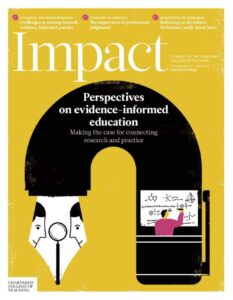
Simon Bayliss considers the impact of reading Jung-Sook Lee’s research on the factors that make a difference to students’ learning, behaviour and engagement with learning.
Prior to becoming a teacher, I trained and worked as a paramedic within the NHS. Throughout my time as a paramedic, one rule was always paramount: engage with research. During my training, entire units of study were given over to what was termed ‘evidence-based practice’ within medicine; reading contemporary studies into medical treatments, being able to weigh and judge best evidence and applying it into my day-to-day working life were crucial. Even with something so seemingly constant as the human body, things changed; whether it was the best way to treat a cardiac arrest, the management of heart attacks using blood-thinning drugs or the recognition of the subtle signs of illness in children, things changed. Being able to use evidence to inform my practice made me more effective, more aware and more able to promote health.
As teachers, we face an ever-changing set of demands. How best to promote progress in our students and provide the best education that we can is at the forefront of all of our minds. I have never been in any doubt that the ‘evidence-based practice’ approach so widely used in medicine is equally important in education.
Early in my training to become a teacher, I read an article written by Jung-Sook Lee (2012) on the effect of the teacher-student relationship and academic pressure on engagement and performance, published in the International Journal of Education. The study set out to explore the role of teacher-student relationships in enabling students to achieve – in terms of their reading ability – during their school career.
The study was conducted within 147 schools in the United States and recruited 3,748 15-year-old students. Data from the Program for International Student Assessment (OECD, 2000) was used to measure student outcomes, with up to 35 students selected from each participating school and asked to respond through student questionnaires that explored behavioural engagement, emotional engagement and academic performance. Behavioural engagement referred here to working hard despite difficulty while emotional engagement was typified as the sense of belonging at a school, and these were linked to the reading literacy of students as a measure of academic performance. Teacher-student relationships, in terms of the supportiveness, openness and fairness of teachers, and the culture of a school, in terms of being academically demanding, were assessed.
Lee found that both teacher-student relationships and the academic pressure of a school impacted on the behavioural and emotional engagement of students. However, only the teacher-student relationship was a significant predictor of reading performance. Lee concluded that the school environment, and more specifically the role of the teacher and their interactions with students above other factors, directly impacts on success.
As a young teacher, this study opened my eyes to the effect that a teacher has on a student’s life. It is all too easy to feel powerless when it comes to making an impact on the outcomes of individuals, especially in the face of complex social and home lives. However, Lee’s study showed me that we are not lost in a system; the relationships that we foster with our students are powerful and can transcend even the academic climate of our schools. Put simply, I realised that my aim as a teacher is not for students to feel that they have to work or achieve, but for them to feel that they want to work and achieve.
Since reading this study, my approach to teaching has been established: spend time supporting, being open and being fair and see this as possibly one of the most effective things that I can do to ensure that my students are successful.
In recent years, I have continued to pursue educational research as a cornerstone to my practice; I have completed an MSc in learning and teaching and had the opportunity to conduct my own action research. I now work within the pastoral system in my school as a Head of House, and in my day-to-day job I always come back to this first study to guide the way in which I work and to strive to be better at it!
References
Lee J-S (2012) The effects of the teacher-student relationship and academic press on student engagement and academic performance. International Journal of Education Research 53: 330-340.
OECD (2000) US national data programme for international student assessmentAbbreviated to PISA, a worldwide study by the Organisation for Economic Co-operation and Development (OECD), intended to evaluate educational systems by measuring 15-year-old school students’ knowledge and skills (PISAThe Programme for International Student Assessment, a worldwide study by the Organisation for Economic Co-operation and Development (OECD), intended to evaluate educational systems by measuring 15-year-old school students’ knowledge and skills) (CDROM) (NCES 2004-06) Paris, France: Organisation for Economic Co-operation and Development (producer) 2000; Washington DC: US Department of Education, Institute of Education Sciences, National Centre for Education Statistics (distributor) 2004.
Further Reading
On how to create a supportive learning environment:
Dweck CS (2006) Mindset: The New Psychology of Success. New York: Random House Books.
Rudduck J and McIntyre D (2007) Improving Learning through Consulting Pupils. London:
Routledge.











